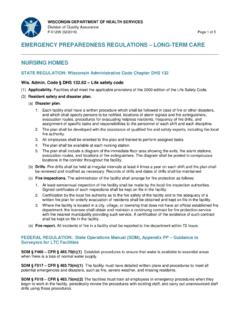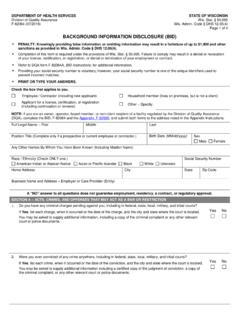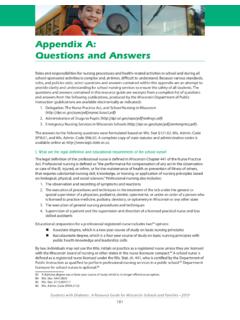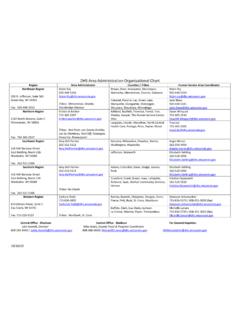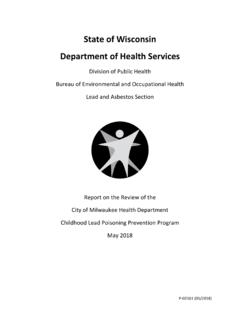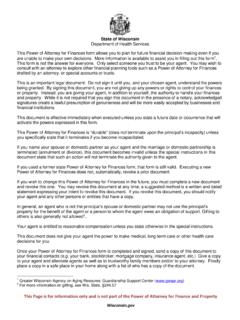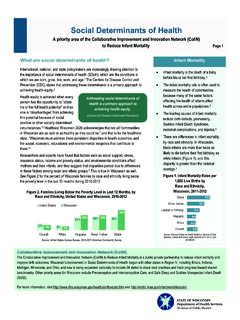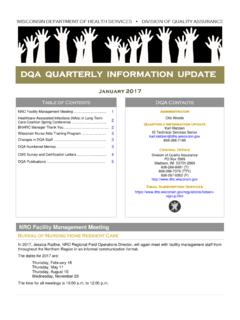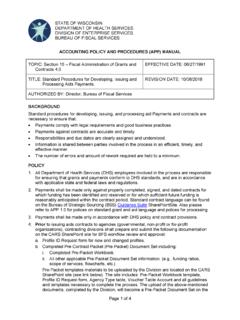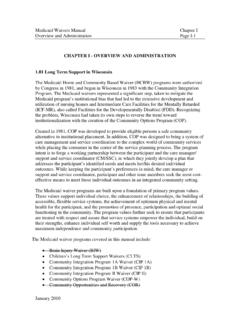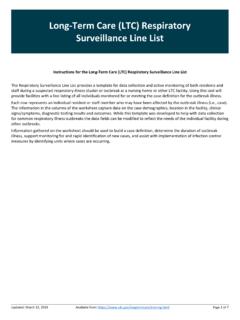Transcription of Person-Directed Dementia Care Assessment Tool
1 Person-Directed Dementia care Assessment Tool A Guide for Creating Quality of Life and Successfully Refocusing Behavior For People with Alzheimer's Disease and Related Dementia In Long Term care Settings STATE OF WISCONSIN. DEPARTMENT OF HEALTH SERVICES. Division of Long Term care P-20084 (08/2014). Developed By The Wisconsin Department of Health Services Bureau of Aging and Disability Resources In Collaboration with the Bureau of Quality Assurance Person-Directed Dementia care Behavior Solutions Study Advisory Committee Person-Directed Dementia care Assessment Tool Table of Contents INTRODUCTION II COMMUNICATION AND LEADERSHIP. Definitions III Communication 22. How to use this Tool V Leadership 22. ENVIRONMENT TEAM STRUCTURE AND ROLES. Sound Level 1 Interdisciplinary Team 23. Ambiance 2 Certified Nursing Assistant (CNA) 24. Space Configuration 2 Nursing 25. Lighting, Colors/Patterns 3 Social Work 26.
2 Visual Cues 4 Activities Professional 27. Personalization of Space 5 Director of Nursing 28. Special care Environment (SCE) Coordinator 29. LANGUAGE AND COMMUNICATION Administrator 30. Language used and Perceptions Created 6 Dietary 31. care PLANS Housekeeping/Laundry 31. Establishment of care Plans 7 Maintenance 32. Assessment Information for care Plans 8. Content of care Plans 11 STAFF KNOWLEDGE AND TRAINING. Use of care Plans 12 Attitudes 33. Training Resources and Frequency 34. ACTIVITIES Best/Promising Practice Knowledge and Topics Activities Practice 13 For Education 35. Activities Implementation 14. Types of Activities 16 POLICIES AND PROCEDURES. Activity Engagement Process 17 Quality Improvement Process for SCE 36. Person-Directed care Practices 37. PROBLEM SOLVING PROCESSES FOR Special care Environment 38. WORKING WITH BEHAVIORAL COMMUNICATION Person with Dementia 's Involvement in Decision Making Process for Understanding Behavioral Communication 18 and Choices 39.
3 Documenting Behavior When Concerns Arise 19. Medication Use for Behavior Symptoms 20 APPENDIX. Resources A1-8. I. Person-Directed Dementia care Assessment Tool Introduction be used to re-assess and measure progress, and identify new areas of focus over time. There are case examples and templates of each document This tool was designed to be used as a guide for in the Appendix. identifying the elements involved in implementing Person- Directed Dementia care , also referred to as the new The Person-Directed Dementia care Assessment Tool culture of Dementia care , Person Centered care , and was developed by an advisory committee of experts, culture change. Research has shown that certain core including care providers, regulators, and advocacy social and emotional needs tend to be neglected for groups. It was initially developed for a study to determine people with Dementia when they are in long-term care what technical assistance and training nursing home settings.
4 The new approach is to plan for each person special care environments would need to manage difficult with Dementia individually; to have the best possible behavior. The results of the study were to be used to outcome by meeting their needs. decrease the incidents of difficult behaviors in Dementia residents; decrease the need for, and use of, There are nine major sections of this tool that examine medications to address behavior symptoms; and improve specific areas of focus vital in providing Person-Directed quality of life. The purpose of the study was to determine care to individuals with Dementia . The tool has been whether Person-Directed approaches could be designed to identify existing strengths of, and areas for successfully used with people who have Dementia . improvement in, Dementia care settings. This tool emphasizes culture change elements, because so many Results of the study are very encouraging.
5 The Person- current systems of practice focus heavily on the details of Directed Dementia care Assessment Tool, resources used physical care . The goal is to provide as much detailed to develop and refine the tool, templates and examples for planning to meet an individual's social and emotional the Working Document and Action Plans, and materials needs as is done for physical care under the medical developed for training and technical assistance (including model. two web-casts, please see page IV for links) that were used in the study are available on the Wisconsin This tool is not meant to be a licensing document or a Department of Health and Family Services web site as prescriptive standard. It is also not meant to be promising practice resources for Dementia care providers. scored. The Person-Directed Dementia care Assessment Tool has been developed as a guide to This study was funded by Civil Money Penalty funds from establish an initial baseline to be used to identify key the Centers for Medicare and Medicaid Services (CMS).
6 Strengths and potential areas for improvement in a Additional training materials used in the study were Dementia care environment. This information is then put developed through an Alzheimer's Disease into a Working Document which provides feedback to Demonstration Grant to States (ADDGS) that was the Dementia care team. The team then uses the awarded to Wisconsin. feedback to develop an Action Plan. The tool can then II. Person-Directed Dementia care Assessment Tool Definitions social, and physical) where the person with Dementia participates and/or resides. It supports the individual's Person-Directed care (PDC): maximum cognitive function and abilities, behavior, and Returns decision making and choices to the independence while ensuring resident safety. person;. Enhances the primary caregiver's capacity to Special care Environment Team (SCT) The SCT. engage with the person and respond to needs; consists of staff from all disciplines that work in or and support the special care environment.
7 The team has Establishes a home environment (non- regular meetings to problem- solve, plan, brainstorm institutional). new ideas, and evaluate the Dementia patient's quality of Person Centered Dementia care (PCC): life, strategies, and approaches being used and team effectiveness. Is care centered on the whole person rather than the disease of the brain;. Interdisciplinary Team (I-Team) The I-Team consists Is care that is centered on the abilities, emotions of Individuals from each major discipline (nursing, and cognitive capacities of the person not on therapies, activities, social work, dietary, etc.) who are the losses; and responsible for conducting ongoing assessments of Is care that gives equal credence to the people who have Dementia . They provide input into care psychosocial context of the individual (vs. planning. The team has regular meetings to review how physical/medical care ).
8 Each aspect of the person's care and function impacts/interacts on the person's quality of life. Ability Centered care /Programming (ACC) ACC is also called activity focused care . It recognizes the Special care Environment Coordinator (SCEC) . person's abilities and competencies in care planning. This is the person who functions as the team lead for Tasks are adapted and modified to provide for the resources, communication, and follow-through on the person's involvement at the maximum level of the SCE plan for people with Dementia . The SCE requires person's ability. Ability Centered care recognizes that a lead person with the responsibility to oversee or activities include every event, encounter, and exchange a coordinate the PDC activities and work with person has with a staff member, volunteer, relative, or implementing and evaluating new processes and other individual. Activities are redefined as traditional changes for the successful implementing of Person- (work related, recreational) and non-traditional bathing, Directed care .
9 This person can be from any discipline. eating, walking). Both independent and structured events Although there is meant to be shared leadership on the are used. SCE Team, the SCE Coordinator is responsible for facilitating the overall plan and making sure that the Special care Environment (SCE) The residential or team works together successfully. non- residential setting is the environment (cultural, 3. Person-Directed Dementia care Assessment Tool Definitions (Cont'd). Minimum Data Set (MDS) This is federal data that is AIMS, DISCUS and MOSES Assessment Tools . required to be collected and submitted about an (Please individual and his or her function and health status upon see Appendix for examples or information.) These are admission, quarterly, and with change in function. standard assessments used to monitor side effects people may develop from taking various medications, Targeted Behavior The behavioral expressions of need particularly anti-psychotics.
10 If certain side effects occur, it (usually of ill-being) that people with Dementia display, is usually an indicator that the medication should be that need to be monitored and addressed until they are changed or discontinued. minimized or stopped. Usually the behavior has a negative effect on self or others, is being addressed Quality of Life Committee This committee can serve through medications, and is being monitored to find different functions in different environments. Basically, it is strategies that can result in the reduction or stopping of an interdisciplinary team that reviews issues relevant to medications. the quality of life of residents and staff. This could involve monitoring behavior, the physical plant, activities, Quality Improvement Plan (QIP) This is the plan that schedules, food, etc., depending on the special care is developed by the teams to monitor and measure the environment.
